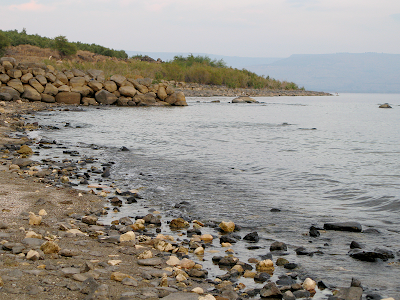< Jesus makes a start | Index | Some issues to grapple with >
Jesus gets away from the crowds and begins to teach his closest followers. There are strong hints here, and more than hints, that leading is going to be costly. It will require great humility and self sacrifice, hard labour, unpopularity and persecution, and (not least) righteousness.
 |
| Galilee with hills on the horizon |
In terms of leadership there are several things to pay attention to here. Yahshua has been travelling throughout Galilee speaking about the good news and showing it in action by healing the sick. As a result he is now being pursued by large crowds, he has become famous.
Heading out - Leaving these crowds deliberately, he goes to a remote spot involving a steep scramble that many of the sick would not have been able to tackle. He sits down on a hillside far above the lake and away from the towns and villages. Only the most determined would have followed him there. He wants to train those who will continue the work of the kingdom after he has returned to the Father.
Leaders all need to do this, at least some of the time. It's essential to reach the crowds, that is the purpose of the mission. But it's every bit as important to pass on the method and the foundational truths to the core followers. What is unique about Yahshua is not that he teaches his followers; all Jewish rabbis did that. He is different because he also goes direct to the crowds. The Pharisees and Sadducees taught their disciples in great detail, but they didn't touch the lives of ordinary people very much.
So here, in Matthew 5:1-20, Jesus comes away from the crowds and does some standard rabbinic teaching. As you read it, remember that he's speaking to leaders, those he will soon be sending out on their own. He needs them to understand some basic truths. And these truths are all back to front. Did the Pharisees think the weak would be blessed?
The beatitudes - These famous sayings of Jesus are very intriguing. Most people are puzzled by them at some level and it's likely the disciples were too. One way to get to the bottom of what seems to be a conundrum is to reverse the individual statements. I outlined this idea a couple of years ago and I have just revisited it in more detail in another post.
But the thing to notice right now is that these statements would have made the disciples think. They would have understood that this Jesus was not motivated by power or wealth, but by humility and compassion. And they would begin to realise that he wanted them to have the same approach to life. This is the underlying philosophy that all church leaders need to have. If not, church becomes an oppressive and hurtful place instead of the place of peace and welcome that Jesus intended.
Trouble, salt and light - In verse 11 Jesus makes it very clear that leaders can expect to suffer in a variety of ways because of him. Why because of him? Simply because anyone who says what Jesus says and does what he does will attract the anger of those holding worldly authority. The scribes, law teachers and Pharisees handed Jesus over for execution. The prophets suffered in the same way. The newly arrested John the Baptist was a very fresh example if one was needed!
And he explained that leaders are responsible for providing flavour and illumination. Those who do not provide these things are of little or no value as leaders in the kingdom. We often read these chapters as if they are written to all believers - and to some degree they are. But specifically they are for the disciples, then and now. Of course, we are all disciples and we are all called to lead and show one another the way. Also, we are all called to the mission of going and making disciples and teaching them everything Jesus taught us. Disciples follow and lead others so that they in turn will become disciples.
And what of the Law? - Jesus explains how his coming affects the Law. Again, it's all about leaders. Those who are obedient and teach others the same will be called great in the kingdom of heaven. Do you want to be called great? You will need to become more righteous than the scribes and Pharisees (who attempted to obey the Law in minute detail). How can any man or woman become righteous? It's only possible by believing Jesus, and if we believe we'll teach others to do the same.
Clearly, the standard for leaders in the church is very high indeed. Not in terms of paper qualifications or head knowledge (the Pharisees had all the learning and theology anyone could wish for). Not in terms of appointed authority (the High Priest had that in spades). But in terms of Christ-likeness.
If you aspire to lead, begin by reading Matthew 5, 6 and 7. Then consider what it means to 'follow Jesus up the mountain'. It is hard and dangerous work but very rewarding.
Questions:
- Are you a leader? What do you think defines a leader?
- Are you following Jesus? If so you are a disciple, doesn't that make you a leader?
- Why do you suppose Jesus wanted to spend so much time with his disciples (rather than the crowds)? Surely the more people he could reach the better.
- Is it better to go wide or deep? Jesus went wide with the crowd and deep with the disciples.
See also:
- Blessing or curse? - Journeys of heart and mind
- Insights from Matthew, flipside of woes - Life with Da Man CD
- Insight from Matthew, kingdom agenda - Life with Da Man CD
- Light on the path - Journeys of heart and mind
- Mount of Beatitudes - Jesus creed
- Reconciling the God of the Old Testament - Subversive1
- Salt and light - Journeys of heart and mind
< Jesus makes a start | Index | Some issues to grapple with >

















